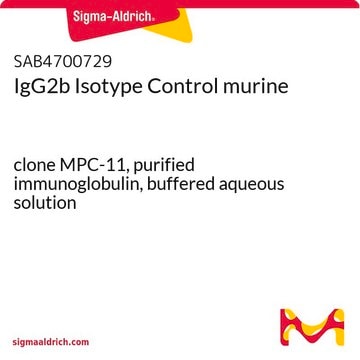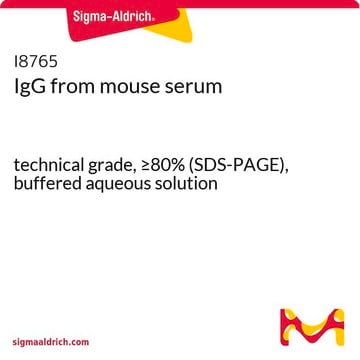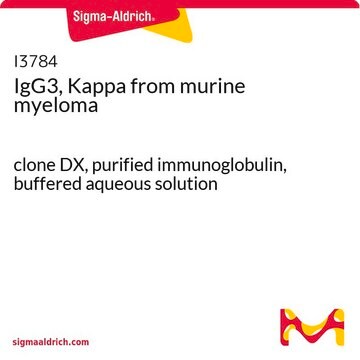M1395
IgG2b, Kappa from murine myeloma
clone MOPC 195, ascites fluid, lyophilized powder
Synonym(s):
Mouse IgG2b-κ
Sign Into View Organizational & Contract Pricing
All Photos(1)
About This Item
Recommended Products
biological source
mouse
Quality Level
conjugate
unconjugated
antibody form
ascites fluid
clone
MOPC 195, monoclonal
form
lyophilized powder
storage temp.
2-8°C
target post-translational modification
unmodified
Looking for similar products? Visit Product Comparison Guide
Related Categories
General description
IgG antibodies are mainly responsible for the facilitation of humoral immune responses such as complement fixation, placental transport, and phagocytosis .
Mouse IgG2b, Kappa is produced in the MOPC 195 tumor line , is a mineral oil-induced plasmacytoma originated and carried intraperitoneally in BALB/c mice.
The MOPC 195 tumor line that produces mouse IgG2b, k is a mineral oil-induced plasmacytoma originated and carried intraperitoneally in BALB/c mice.
The hapten binding specificity of the MOPC 195 line has not been determined. The ascites produced from the MOPC 195 tumor line contains IgG2b, k in addition to normal levels of other mouse immunoglobulins and serum proteins. The ascites fluid is clarified by centrifugation and filtration.
The hapten binding specificity of the MOPC 195 line has not been determined. The ascites produced from the MOPC 195 tumor line contains IgG2b, k in addition to normal levels of other mouse immunoglobulins and serum proteins. The ascites fluid is clarified by centrifugation and filtration.
Specificity
Goat anti-guinea pig IgG (whole molecule) -alkaline phosphatase antibody reacts specifically with IgG of guinea pig.
Identity and purity of the antibody is established by immunoelectrophoresis (IEP) and Ouchterlony Double Diffusion (ODD). Electrophoresis of the ascites fluid followed by diffusion versus anti-mouse IgG2b and anti mouse kappa chain results in single arcs of precipitation. By ODD the ascites fluid (containing mouse IgG2b, k) is compared to purified myeloma protein.
Immunogen
Purified guinea pig IgG
Application
Anti-guinea pig IgG (whole molecule) −alkaline phosphatase antibody (diluted 1: 30,000 in PBST with 0.2% BSA and 2% PVP) can be used in ELISA. It is also useful in western blotting and immunohistology.
Quality
Each vial contains at least 5mg of mouse IgG2b, k myeloma protein, determined by densitometry of electrophoresed ascites fluid.
Physical form
lyophilized powder
Storage and Stability
To one vial of lyophilized powder, add 1 ml of deionized water and an appropriate antimicrobial agent (e.g. sodium azide) to a final concentration of 15 mM. Rotate vial gently until powder dissolves. Prior to reconstitution store the product at 2-8 °C. After reconstitution, the solution may be stored frozen in working aliquots. Repeated freezing and thawing is not recommended. If slight turbidity occurs upon prolonged storage clarify the solution by centrifugation before use
Disclaimer
Unless otherwise stated in our catalog or other company documentation accompanying the product(s), our products are intended for research use only and are not to be used for any other purpose, which includes but is not limited to, unauthorized commercial uses, in vitro diagnostic uses, ex vivo or in vivo therapeutic uses or any type of consumption or application to humans or animals.
Storage Class Code
11 - Combustible Solids
WGK
WGK 3
Flash Point(F)
Not applicable
Flash Point(C)
Not applicable
Personal Protective Equipment
dust mask type N95 (US), Eyeshields, Gloves
Certificates of Analysis (COA)
Search for Certificates of Analysis (COA) by entering the products Lot/Batch Number. Lot and Batch Numbers can be found on a product’s label following the words ‘Lot’ or ‘Batch’.
Already Own This Product?
Find documentation for the products that you have recently purchased in the Document Library.
E Gustafsson et al.
Biology of reproduction, 51(6), 1173-1180 (1994-12-01)
Mice lacking functional B cells because of a genetic deletion of the mu chain (IgM) gene were used to investigate the role of perinatal and postnatal transfer of maternal IgG in neonatal growth. Our results confirmed that immunoglobulin (Ig)-deficient mice
A V Karasev et al.
Phytopathology, 88(10), 1040-1045 (2008-10-24)
ABSTRACT The beet yellow stunt virus (BYSV) genome contains at least nine open reading frames (ORFs) that code for proteins ranging from 6 to 66 kDa. Based on amino acid sequence comparisons, the coat protein (CP) was previously identified as
Xing-He Weng et al.
The Journal of experimental biology, 206(Pt 13), 2211-2219 (2003-05-29)
The V-type H(+)-ATPase is thought to provide the driving force for transepithelial electrolyte and fluid secretion in Malpighian tubules. To confirm the presence of this proton pump in Malpighian tubules of the yellow fever mosquito Aedes aegypti, we used several
Hongxia Duan et al.
The Journal of clinical investigation, 131(21) (2021-09-08)
Initiation of T cell receptor (TCR) signaling involves the activation of the tyrosine kinase LCK; however, it is currently unclear how LCK is recruited and activated. Here, we have identified the membrane protein CD146 as an essential member of the
Tomohiro Tanaka et al.
Oncology reports, 46(1) (2021-05-21)
Trophoblast cell surface antigen 2 (TROP2), reported to be overexpressed in several types of cancer, is involved in cell proliferation, invasion, metastasis, and poor prognosis of many types of cancer. Previously, a highly sensitive anti‑TROP2 monoclonal antibody (clone TrMab‑6; mouse IgG2b, κ)
Our team of scientists has experience in all areas of research including Life Science, Material Science, Chemical Synthesis, Chromatography, Analytical and many others.
Contact Technical Service







